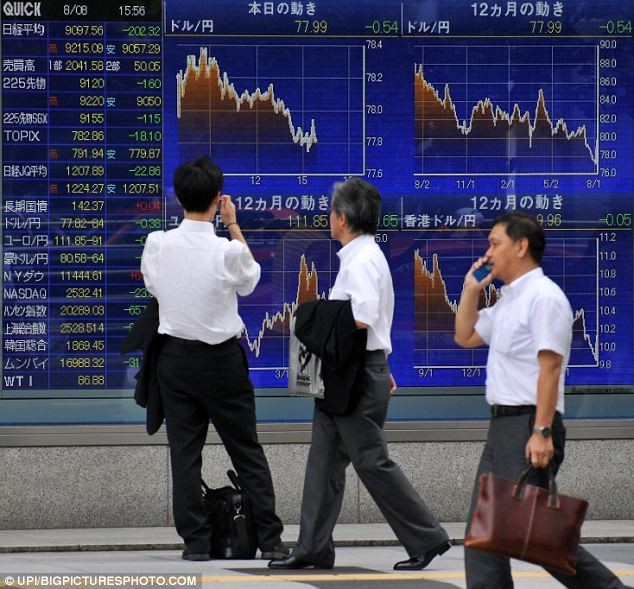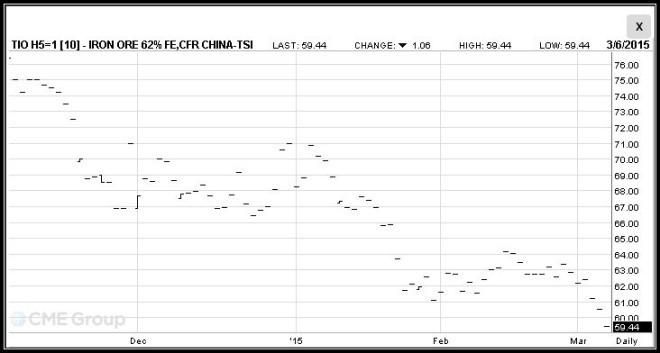Chinese Stock Market Set To Reach 5 000 Mark Despite Recent Plunge
Post on: 4 Апрель, 2015 No Comment

It is indeed a tough fight to scale the peaks of the US stock market. The Dow Jones Industrial Average fought hard to stay above the 17,000-point level. The next peak to conquer is 18,000 points, which had been surpassed previously. The move, however, was unsustainable. It appears that the recent correction on Wall Street, the collapse of oil prices and the Greek political crisis were all exaggerated by speculators with the intention of stirring up the market.
The market is making much fuss over the plunge in oil prices. Russia, Saudi Arabia and Iraq are ramping up their oil production to make up for the loss of income caused by falling prices. However, the higher the oil production goes, the further prices will fall. On the other hand, oil prices today are still higher than 10 years ago. Back then, there was no such fear of oil being too cheap; all talk of a crisis are really due to institutional players leading the market by its nose and launching targeted attacks on oil.
China is hard at work piping natural gas and shipping oil from Russia. Oil tanker companies are earning big bucks now, thanks to their major client, China. The biggest challenge now is the building of a large number of oil storage facilities within a very short period. The reason the US stock market is going through a major correction now boils down to the fact that it is unable to sustain at its high level, rather than because of the Greek debt crisis or the collapse in oil prices.
The euro is already showing signs of being under devaluation pressure. The surprise decision of the Swiss government to unpeg the Swiss franc from the euro may be driven by its fear that its currency will be devalued along with the euro. This has resulted in a spike in the Swiss francs exchange rate with the euro and the US dollar, which also goes to show that the greenback is not unassailable.
The constant reminder of a possible rate hike has driven up the US dollar over the past few months. If the Fed does not raise interest rates in the next three to five months, the US dollar may not be able to hold on to its current strength. Should the greenback weaken, it will serve to buffer the slide in oil prices. For this reason, do not write off oil-related stocks yet. The ultra-low interest rate in the Western world today has become a new norm; everyone has gotten used to life in the near-zero interest rates environment. So, would the Fed risk another financial crisis by raising interest rates?
Just as the bull run in the Chinese A-shares seemed to be unstoppable, the Shanghai stock market registered a huge correction on 19 January, registering the bourse’s largest single day loss since June 2008. Apparently, the Chinese government is taking steps to cool down the over-heated stock market. It started by sending warnings via its mouthpiece, the Xinhua news agency. When that did not work, the Chinese government decided to act decisively by singling out a number of listed security firms and disciplined them for regulatory violations. They were slapped with a three-month ban on opening new margin-lending accounts, which triggered a mass exodus of funds from the A-shares and caused these counters to lose ground.
Interestingly, the Chinese government announced their decision to target these security firms after the Hong Kong stock market closed for the day on 16 January. The Hong Kong Stock Exchange closes at 4pm while the Singapore stock market opens till 5pm. Therefore, the China A50 ETFs issued by financial institutions in Singapore were able to liquidate first, while the A-shares index futures can also be shorted first. This is one of the advantages of having a longer trading day.
However, the Shanghai Stock Exchange Composite Index (SHCOMP) was able to regain some lost ground the next day. The SHCOMP has demonstrated the same correction pattern in the past – a fast, big drop that lasted only for a short time. Investors who were expecting the corrections to continue for a few more days before making a kill discovered to their chagrin that they had missed the opportunity yet again.
Everyone wishes to buy at the lowest level, but the possibility of doing so is very remote. We should therefore cast our sights further and higher. The economic slowdown in China is a fact now, yet exactly because of this, the Chinese government will have to take steps to prop up the market.
During the financial crisis in 2008, then-Premier Wen Jiabao launched Rmb4 trillion worth of infrastructure projects, which helped the SHCOMP to double up within a year. This time round, President Xi Jinping made an even bolder move to approve Rmb10 trillion worth of infrastructure projects, of which Rmb7 trillion worth will start this year. Of course, the financial power of the Chinese government today is far greater than back in 2008. Yet, the Rmb4 trillion pledged back then was fully funded by the government, whereas the Rmb10 trillion this time round is a mixture of public, private and foreign funds.
The money will not come from the government printing more money, but instead from funds from the private sector. In order to raise funds among the people, the stock market must be more attractive. For this reason, energising the stock market became a state policy. In light of this, it is no surprise that the Chinese Academy of Social Sciences (CASS) seems to have taken a sudden interest in the stock market, so much so as to release a forecast that the SHCOMP may reach 5,000 points. As a state-level research institute, the motive for CASS to cast such optimism over the stock market is very clear. Apart from private funding, bank financing is also another key source of funds. For this reason, the prime choice of Chinese stocks for investors is undoubtedly the banking sector.

Hong Kongs richest man, tycoon Li Ka-Shing, has announced a major restructuring of Cheung Kong and Hutchison Whampoa by merging these two entities into one. The new company thus formed is named CK Hutchison Holdings (CKH), while all property businesses in the two companies will be injected into another new entity, Cheung Kong Property Holdings (CKPH), which will be corporately owned by existing Hutchison shareholders. In other words, investors holding Cheung Kong or Hutchison Whampoa shares today will eventually become shareholders of both CKH and CKPH.
Interestingly, once Li announced this restructuring proposal, share prices of both Cheung Kong and Hutchison Whampoa rose sharply. Overnight, both companies are jointly worth nearly HK$100 billion more. Analysts from major securities firms said that the restructuring can potentially unlock the value of share prices, because the value of Hutchison Whampoa, which is controlled by Cheung Kong Holdings, is not reflected in Cheung Kongs share price.
In one fell swoop, Li has raised the share prices of both companies and unlocked their values. Would the tycoons in Singapore follow suit? The question that needs to be answered is: which is more important – unlocking value or retaining control over their vast business empire?
After the restructuring, Lis direct shareholding will drop from 43.4 percent to 30.2 percent. Why then is he doing this? Why did he not simply distribute the shares of Hutchison Whampoa that Cheung Kong owns among its shareholders? The point here is about control. If the shares were to be simply redistributed, Li would own just 21.7 percent of CKH, which he would definitely not be happy with.
Dr Chan Yan Chong is a renowned investment expert with many accolades under his belt.














